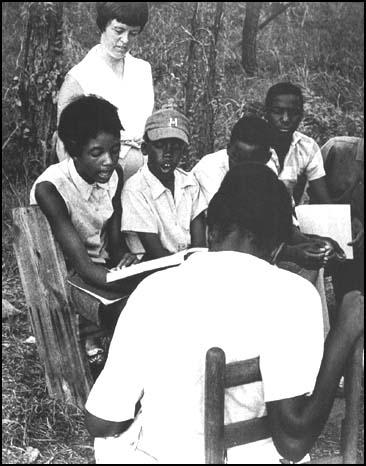Head Start
In 1964 the Congress on Racial Equality (CORE), Student Nonviolent Coordinating Committee (SNCC) and the the National Association for the Advancement of Coloured People (NAACP) organised its Freedom Summer campaign. Its main objective was to try an end the political disenfranchisement of African Americans in the Deep South.
The campaign also established 30 Freedom Schools in towns throughout Mississippi. Volunteers taught in the schools and the curriculum now included black history and the philosophy of the civil rights movement. During the summer of 1964 over 3,000 students attended these schools and the experiment provided a model for future educational programs such as Head Start.
The first Head Start program took place during the summer of 1965. Lasting eight weeks, it was so successful it became a national, year-round program in 1966. The local community had to provide 10 per cent of the costs with the federal government paying the rest. The main purpose of the the program is to help deprived pre-school children achieve their full potential.

Primary Sources
(1) Rita Schwerner, application letter to join CORE's Freedom Summer project in 1964.
Since I have become active in CORE here in New York, I have become increasingly aware of the problems which exist in the Southern states. I have a strong desire to contribute in some small way, by the utilization of those skills which I possess, to the redress of the many grievances occurring daily. I wish to become an active participant rather than a passive onlooker.
As a teacher I have been working in South Jamaica, Queens where I not only have had experience in dealing with teenagers, but have become increasingly concerned with the conditions under which these children must live.
As my husband and I are in close agreement as to our philosophy and involvement in the civil rights struggle, I wish to work near him, under the direction of CORE, in whatever capacity I may be most useful. My hope is to someday pass on to the children we may have a world containing more respect for the dignity and worth of all men that that would which was willed to us.
(2) In 1940 Malcolm Little moved to Boston where he attended the high school in Roxbury. He later recalled a conversation with his English teacher.
I happened to be alone in the classroom with Mr. Ostrowski, my English teacher. He was a tall, rather reddish white man and he had a thick mustache. I had gotten some of my best marks under him, and he had always made me feel that he liked me. I know that he probably meant well in what he happened to advise me that day. I doubt that he meant any harm. It was just in his nature as an American white man.
He told me, "Malcolm, you ought to be thinking about a career. Have you been giving it thought?" The truth is, I hadn't. I had never figured out why I told him, "Well, yes, sir, I've been thinking I'd like to be a lawyer."
Mr. Ostrowski looked surprised, I remember, and leaned back in his chair and clasped his hands behind his head. He kind of half-smiled and said, "Malcolm, one of life's first needs is for us to be realistic. Don't misunderstand me, now. We all here like you, you know that. But you've got to be realistic about being a ******. A lawyer - that's no realistic goal for a ******. You need to think about something you can be. You're good with your hands - making things. Everybody admires your carpentry shop work. Why don't you plan on carpentry? People like you as a person - you'd get all kind of work."
